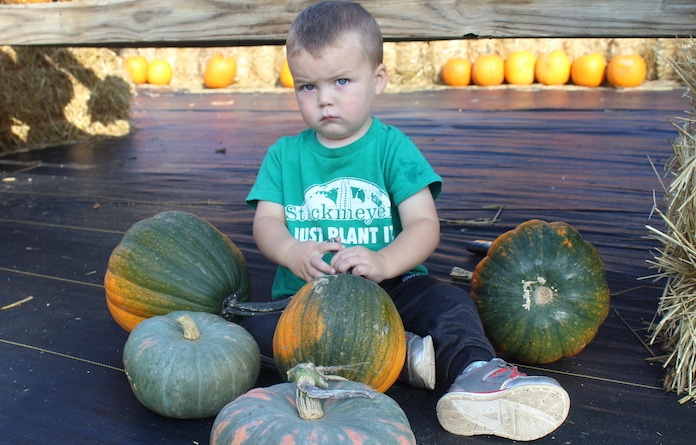Never fear, pumpkins are here

The words “phytophthora blight” sound like something out of a horror movie, and the vine infection pretty much is to pumpkin farmers and pumpkin lovers alike.
When talk of the infection spread through the news, many began to fear a shortage. What would autumn be without pumpkin pie on Thanksgiving or jack-o-lanterns on Halloween?
Local growers Nathan Johanning, a University of Illinois Extension commercial agriculture educator, and Dianne Stuckmeyer of Stuckmeyer’s Plants and Produce quelled the fears: there is not a shortage of whole pumpkins in this area.
“Most everywhere, especially from local farms and things, I’ve seen a good supply. I don’t think there are any crop issues locally,” Johanning said. “There should be ample opportunity for folks in our area to find the decorative pumpkins they want to use – large or small, for kids, on the front porch or whatever their needs may be.”
Other areas may not be so lucky, Johanning said.
Heavy rainfall can cause the infection to occur, especially during the summer months. As Johanning explained, farmers typically start planting and preparing their fields in early June so the first ripe pumpkins show up by late August to early September.
“Weather patterns can vary greatly even by just a few counties, so just because there’s an issue of say a disease or pest in some kind of area, it doesn’t mean the whole state is the exact same way,” Johanning said. “It can vary from literally one end of the spectrum to another as far as weather and crop conditions all within the same state. Especially due to how long the state is, our climate and issues can be greatly different from even within the state and certainly even region.”
Stuckmeyer said she has read some articles about farmers in other areas battling this problem.
“(Phytophthora blight) is real bad,” Stuckmeyer said. “Your leaves start to die, so your vines start to die and shut down early, therefore your pumpkins either rot or mature. If they mature, a lot of times they’re on the smaller side because they weren’t done growing yet.”
Even worse, farmers who experience pumpkin blight in many ways have their hands tied.
“A lot of it has to do with the weather, so since you have no control over that, it’s really hard to control,” Stuckmeyer said.
While Monroe County will not be seeing a shortage of whole pumpkins from local producers, pumpkin blight may impact the supply of canned pumpkin in stores.
Johanning explained most commercial pumpkins that are sold to canneries are grown up north by the canneries.
As St. Louis Public Radio and Heart of Illinois ABC reported, blight was detected up north Morton, on a test plot early in the growing season.
Mohammed Babadoost, a professor of plant pathology at the University of Illinois, said the disease’s early arrival is particularly concerning and may impact supermarkets’ canned pumpkin stock.
“If we do not have enough processed pumpkins, we may not have enough canned pumpkin for, let’s say, Thanksgiving,” Babadoost told STLPR.
Pumpkin pie lovers are not completely out of luck, however.
Many of Monroe County’s pumpkin producers – including Johanning Farm and Stuckmeyers – supply pumpkins that customers can process at home.
Just because Johanning and Stuckmeyer may not have been battling large portions of blight does not mean this year’s harvest was an easy feat.
As Johanning explained, certain threats like cucumber beetles and squash bugs, as well as other diseases, present themselves every season.
“There are always various insects and diseases that can plague pumpkin crops, and most growers have to use various practices … in order to have a healthy crop,” Johanning said, later adding, “We on our farm use a lot of tactics. We rotate crops and try to do different conservation tillage to preserve and maintain a healthy soil, and then sometimes we will spray fungicides or insecticides whenever we see a pest, but only when we have to.”
He said a lot of other area farms use the same, or a very similar, strategy.
For more information on Stuckmeyer Plants & Produce, click here. or stop by for a fun-filled, family visit. The Stuckmeyers currently have inflatable slides and more for kids to enjoy.
For more on Johanning Farm, visit their Facebook page.






